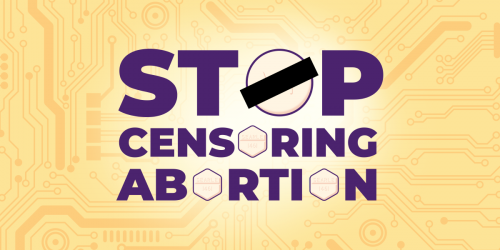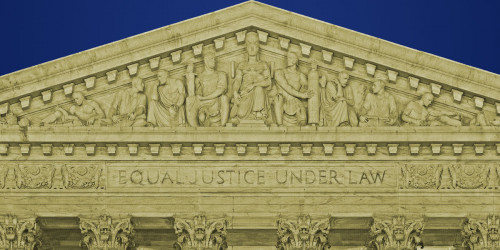BY MOLLY BUCKLEY | October 1, 2025
This is the eighth installment in a blog series documenting EFF's findings from the Stop Censoring Abortion campaign. You can read additional posts here.
In our Stop Censoring Abortion series, we’ve documented the many ways that reproductive rights advocates have faced arbitrary censorship on Meta platforms. Since social media is the primary—and sometimes the only—way that providers, advocates, and communities can safely and effectively share timely and accurate information about abortion, it’s vitally important that platforms take steps to proactively protect this speech.
Yet, even though Meta says its moderation policies allow abortion-related speech, its enforcement of those policies tells a different story. Posts are being wrongfully flagged, accounts are disappearing without warning, and important information is being removed without clear justification.
So what explains the gap between Meta’s public commitments and its actions? And how can we push platforms to be better—to, dare we say, #StopCensoringAbortion?
After reviewing nearly one-hundred submissions and speaking with Meta to clarify their moderation practices, here’s what we’ve learned.
Platforms’ Editorial Freedom to Moderate User Content
First, given the current landscape—with some states trying to criminalize speech about abortion—you may be wondering how much leeway platforms like Facebook and Instagram have to choose their own content moderation policies. In other words, can social media companies proactively commit to stop censoring abortion?
The answer is yes. Social media companies, including Meta, TikTok, and X, have the constitutionally protected First Amendment right to moderate user content however they see fit. They can take down posts, suspend accounts, or suppress content for virtually any reason.
The Supreme Court explicitly affirmed this right in 2023 in Moody v. Netchoice, holding that social media platforms, like newspapers, bookstores, and art galleries before them, have the First Amendment right to edit the user speech that they host and deliver to other users on their platforms. The Court also established that the government has a very limited role in dictating what social media platforms must (or must not) publish. This editorial discretion, whether granted to individuals, traditional press, or online platforms, is meant to protect these institutions from government interference and to safeguard the diversity of the public sphere—so that important conversations and movements like this one have the space to flourish.
But with that freedom comes responsibility. The Santa Clara Principles on Transparency and Accountability in Content Moderation lay out a model for what responsible moderation should look like: platforms set their own rules voluntarily, but they should do so transparently and, following basic due process principles, should enforce those rules consistently. Users deserve to know what the policies are, why content is removed, and how to challenge decisions when platforms get it wrong.
Meta’s Broken Promises
Unfortunately, Meta is failing to meet even these basic standards. Again and again, its policies say one thing while its actual enforcement says another.
Meta has stated its intent to allow conversations about abortion to take place on its platforms. In fact, as we’ve written previously in this series, Meta has publicly insisted that posts with educational content about abortion access should not be censored, even admitting in several public statements to moderation mistakes and over-enforcement. One spokesperson told the New York Times: “We want our platforms to be a place where people can access reliable information about health services, advertisers can promote health services and everyone can discuss and debate public policies in this space. . . . That’s why we allow posts and ads about, discussing and debating abortion.”
Meta’s platform policies largely reflect this intent. But as our campaign reveals, Meta’s enforcement of those policies is wildly inconsistent. Time and again, users—including advocacy organizations, healthcare providers, and individuals sharing personal stories—have had their content taken down even though it did not actually violate any of Meta’s stated guidelines. Worse, they are often left in the dark about what happened and how to fix it.
Arbitrary enforcement like this harms abortion activists and providers by cutting them off from their audiences, wasting the effort they spend creating resources and building community on these platforms, and silencing their vital reproductive rights advocacy. And it goes without saying that it hurts users, who need access to timely, accurate, and sometimes life-saving information. At a time when abortion rights are under attack, platforms with enormous resources—like Meta—have no excuse for silencing this important speech.
Our Call to Platforms
Our case studies have highlighted that when users can’t rely on platforms to apply their own rules fairly, the result is a widespread chilling effect on online speech. That’s why we are calling on Meta—and other platforms—to adopt the following urgent changes.
1. Publish clear and understandable policies.
Too often, platforms’ vague rules force users to guess what content might be flagged in order to avoid shadowbanning or worse, leading to needless self-censorship. To prevent this chilling effect, platforms should strive to offer users the greatest possible transparency and clarity on their policies. The policies should be clear enough that users know exactly what is allowed and what isn’t so that, for example, no one is left wondering how exactly a clip of women sharing their abortion experiences could be mislabeled as violent extremism.
The Santa Clara Principles offer a few more pointers. Platforms should draft and publish policies such that users can readily understand:
- What types of content are prohibited by the company and will be removed, with detailed guidance and examples of permissible and impermissible content;
- What types of content the company will take action against other than removal, such as algorithmic downranking, with detailed guidance and examples on each type of content and action; and
- The circumstances under which the company will suspend a user’s account, whether permanently or temporarily.
2. Enforce rules consistently and fairly.
If content doesn’t violate a platform’s stated policies, it should not be removed. And, per Meta’s own policies, an account should not be suspended for abortion-related content violations if it has not received any prior warnings or “strikes.” Yet as we’ve seen throughout this campaign, abortion advocates repeatedly face takedowns or even account suspensions of posts that fall entirely within Meta’s Community Standards. On such a massive scale, this selective enforcement erodes trust and chills entire communities from participating in critical conversations.
3. Provide meaningful transparency in enforcement actions.
When content is removed, Meta tends to give vague, boilerplate explanations—or none at all. Instead, users facing takedowns or suspensions deserve detailed and accurate explanations that state the policy violated, reflect the reasoning behind the actual enforcement decision, and ways to appeal the decision. Clear explanations are key to preventing wrongful censorship and ensuring that platforms remain accountable to their commitments and to their users.
4. Guarantee functional appeals.
Every user deserves a real chance to challenge improper enforcement decisions and have them reversed. But based on our survey responses, it seems Meta’s appeals process is broken. Many users reported that they do not receive responses to appeals, even when the content did not violate Meta’s policies, and thus have no meaningful way to challenge takedowns. Alarmingly, we found that a user’s best (and sometimes only) chance at success is to rely on a personal connection at Meta to right wrongs and restore content. This is unacceptable. Users should have a reliable and efficient appeal process that does not depend on insider access.
5. Expand human review.
Finally, automated systems cannot always handle the nuance of sensitive issues like reproductive health and advocacy. They misinterpret words, miss important cultural or political context, and wrongly flag legitimate advocacy as “dangerous.” Therefore, we call upon platforms to expand the role that human moderators play in reviewing auto-flagged content violations—especially when posts involve sensitive healthcare information or political expression.
Users Deserve Better
Meta has already made the choice to allow speech about abortion on its platforms, and it has not hesitated to highlight that commitment whenever it has faced scrutiny. Now it’s time for Meta to put its money where its mouth is.
Users deserve better than a system where rules are applied at random, appeals go nowhere, and vital reproductive health information is needlessly (or negligently) silenced. If Meta truly values free speech, it must commit to moderating with fairness, transparency, and accountability.
This is the eighth post in our blog series documenting the findings from our Stop Censoring Abortion campaign. Read more at https://www.eff.org/pages/stop-censoring-abortion
Affected by unjust censorship? Share your story using the hashtag #StopCensoringAbortion. Amplify censored posts and accounts, share screenshots of removals and platform messages—together, we can demonstrate how these policies harm real people.













